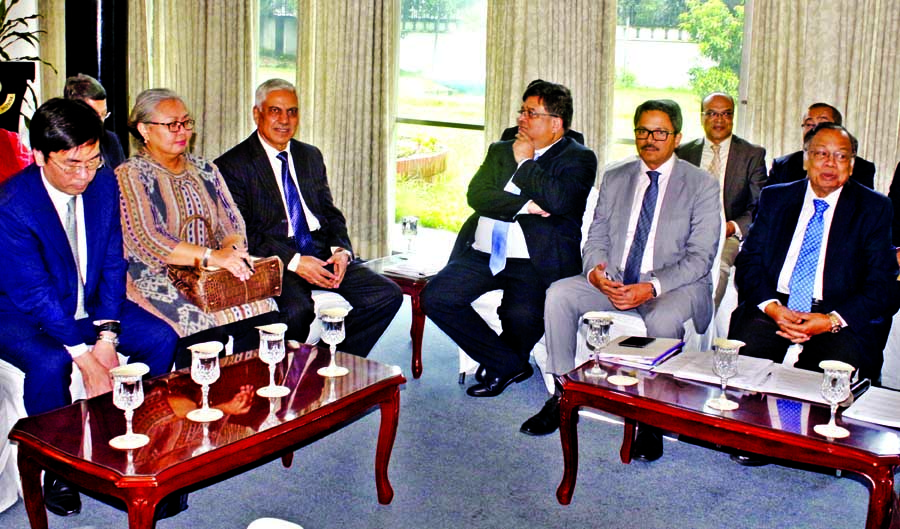
Staff Reporter :
The UN human rights chief on Monday said that the violence and injustice faced by the ethnic Rohingya minority in Myanmar, where UN rights investigators have been barred from entering, “seems a textbook example of ethnic cleansing.”
“As Myanmar has refused access to human rights investigators, the current situation cannot yet be fully assessed, but the situation seems a textbook example of ethnic cleansing,” Zeid Ra’ad Al Hussein told the UN Human Rights Council yesterday.
The Rohingyas are reviled in Myanmar, where the roughly one million-strong community is accused of being illegal immigrants from Bangladesh, according to portal newspapers and agencies.
The UN says 294,000 bedraggled and exhausted Rohingya refugees have arrived in Bangladesh since the reported militants’ attacks on Myanmar security forces in neighbouring Rakhine state on August 25 have sparked a major military backlash.
Tens of thousands more are believed to be on the move inside Rakhine after more than two weeks without shelter, food and water.
“The operation… is clearly disproportionate and without regard for basic principles of international law,” Zeid said.
Zeid Ra’ad, who is a Jordanian prince, denounced how “another brutal security operation is underway in Rakhine state – this time, apparently on a far greater scale.”
He pointed to satellite imagery and reports of “security forces and local militia burning Rohingya villages” and committing extrajudicial killings.
“The Myanmar government should stop pretending that the Rohingyas are setting fire to their own homes and laying waste to their own villages,” he added.
He called it a “complete denial of reality” that hurts the standing of Myanmar, a country that had until recently – by opening up politics to civilian control – enjoyed “immense good will.”
Zeid said he was “further appalled” by reports that Myanmar authorities were planting land mines along the border.
Human Rights Watch (HRW) on Monday said the UN, other multilateral organizations, and countries with influence should press the Burmese government to urgently allow humanitarian aid to reach ethnic Rohingya Muslims at risk in Burma’s Rakhine State.
They should also ensure that adequate assistance reaches the more than 270,000 Rohingya and other refugees who have recently fled to Bangladesh.
The Burmese military’s abusive campaign against the Rohingya population was sparked by an August 25, 2017 attack by militants belonging to the Arakan reported Rohingya Salvation Army (ARSA), which targeted about 30 police posts and an army base.
In addition to the Rohingya refugees in Bangladesh, tens of thousands remain displaced within Myanmar.
Another nearly 12,000 people, mainly ethnic Rakhine and other non-Muslims, are also displaced in Rakhine State.
“The humanitarian catastrophe that Burma’s security forces have created in Rakhine State has been multiplied by the authorities’ unwillingness to provide access to humanitarian agencies,” said Philippe Bolopion, Deputy Director for Global Advocacy at HRW.
“The UN, ASEAN, and the Organization of Islamic Cooperation need to ramp up the pressure on Myanmar and provide more assistance to Bangladesh to promptly help Rohingya and other displaced people.”
Rohingya refugees in Bangladesh told HRW that Burmese government security forces had carried out armed attacks on villagers, inflicting bullet and shrapnel injuries, and burned down their homes.
The killings, shelling, and arson in Rohingya villages have all the hallmarks of a campaign of “ethnic cleansing.”
International aid activities in much of Rakhine State have been suspended, leaving approximately 250,000 people without food, medical care, and other vital humanitarian assistance. Refugees told HRW that while many people from Maungdaw Township could escape to Bangladesh, tens of thousands of displaced Rohingya are still hiding in the areas surrounding Rathedaung and Buthidaung.
About 34,000 officially registered Rohingya refugees are in Bangladesh, plus an estimated 300,000 to 500,000 who are unregistered.
Another approximately 87,000 people arrived after fleeing military attacks in Rakhine State from October 2016 to March 2017, following ARSA attacks in October.
After the state crackdown following the August 2017 ARSA attack, aid workers in Bangladesh think the number of new arrivals will swell to over 300,000.
Crossing the Naf River during the monsoon is dangerous, and according to border guard officials and other sources, more than two dozen people have drowned trying to cross the border.
Those who make it across can only huddle in makeshift tents to seek shelter from the constant downpour of monsoon rains.
Hospitals are operating well beyond capacity, and health officials say they fear outbreaks of disease as a result of overcrowding and poor sanitation.
A 17-year-old Rohingya refugee in a hospital in Bangladesh with a bullet wound in his arm told HRW that he had no idea what will happen to him after he is discharged.
He said he had “no family, no friends, no contacts, and no money in Bangladesh.” Border guard officers said that they had already encountered many such cases of unaccompanied children lost in the confusion of flight.
Bangladesh has rebuffed international assistance in the past, out of fear that it might serve as a pull factor for Rohingya refugees.
However, as is evident from thousands pouring in every day despite the lack of adequate food and shelter, people escape to save their lives.
As far as RW is able to determine, the government has largely abstained from pushing back those fleeing Burma. However, the lack of sufficient international support for Bangladesh has contributed to appalling conditions in the border areas.
“The humanitarian situations in Burma and Bangladesh will continue to deteriorate so long as Burmese security forces are carrying out mass atrocities in Rakhine State,” Bolopion said.
“The UN Security Council should publicly hold an emergency meeting and demand that the Burmese authorities stop the violence against the Rohingya population and allow aid to flow in, or face sanctions.”

